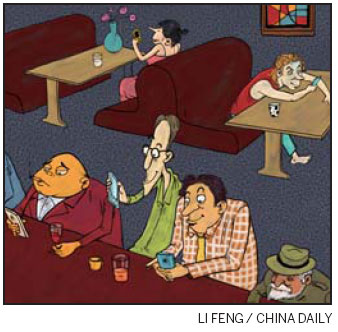 |
Large Medium Small |
About 10 years ago, when phones merely made calls, I had a barroom discussion with a group of colleagues about the advantages of having a mobile device that was connected to the Internet.
My boss, at that time, reckoned there was no need for such a device. He predicted that being constantly connected to the Web would make us part machine and it would be the end of communication, as we knew it.

He was right, in a way, because sometimes when I go to a restaurant or club all the "cool" people are buried in their smart phones and virtually ignore the person sitting directly opposite. It's almost like they are frightened of having to actually engage in "real-time" conversations with real people.
It's not even ironic that currently the smartest phone on the market (the iPhone iSO 4) isn't much of a phone at all because it has a faulty antenna. Obviously, calling people is a secondary function.
Our technology has changed and therefore we have changed. Even memory isn't what it used to be.
This was summed up by a recent article in The New York Times called The Web means the end of forgetting, which put forward the idea that all those moments from our lives, now on social networking sites, could be summoned up and brought back to life, no discussion about true or false, the vagaries of the human mind and memory loss.
Here we are, total recall.
Some of this was predicted in the 1960s by the philosopher Marshall McLuhan, who is most famous for introducing aphorisms and words like "the medium is the message", "global village" and even "surfing" for information.
McLuhan thought media are extensions of our bodies and minds and believed that as the medium of communication changes the way we think also transforms.
For example, I can remember my family's house phone number 40 years ago, but I don't know what my current phone number is. And it's not just because it's got 11 digits, even without an international code. The point is I just can't be bothered to commit it to memory because I've never actually dialed it and I can "recall" it any time with the press of a button.
Frankly, rote learning, or "stuffing a duck" as it's called in Chinese, seems to have less value when the sum of all information is readily available at our fingertips 24-7. Not taking advantage of the situation would be akin to doing long division when I have a calculator at hand.
As for barroom discussions, thankfully, we no longer have to fruitlessly argue the facts, just what they mean. I can quote greater minds by googling them, or get an opinion from the other side of the world by sending a short message, or hitting the forums.
It could be that my memory is not as good as it used to be since I don't exercise it as vigorously as I used to and, perhaps, I am overly reliant on technology.
Either way, my former boss was right about being hybrid machines. My technology partly defines who I am, and we are all part of the web.
I surf, therefore I am.
